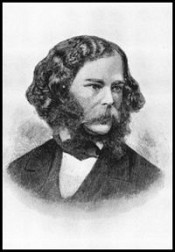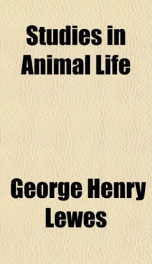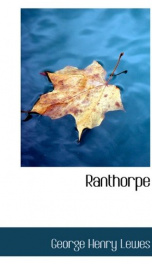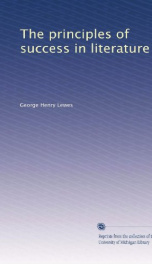Lewes George Henry

George Henry Lewes (18 April 1817 – 28 November 1878) was an English philosopher and critic of literature and theatre. He became part of the mid-Victorian ferment of ideas which encouraged discussion of Darwinism, positivism, and religious skepticism. However, he is perhaps best known today for having openly lived with George Eliot, a soul-mate whose life and writings were enriched by their friendship. Lewes, born in London, was an illegitimate son of a minor poet, John Lee Lewes, and Elizabeth Ashweek and grandson of comic actor Charles Lee Lewes. His mother married a retired sea capain when he was six and frequent changes of home meant he was educated in London, Jersey, Brittany, and finally at Dr Charles Burney's school in Greenwich. Having abandoned successively a commercial and a medical career, he seriously thought of becoming an actor and appeared several times on stage between 1841 and 1850. Finally he devoted himself to literature, science and philosophy. As early as 1836 he belonged to a club formed for the study of philosophy, and had sketched out a physiological treatment of the philosophy of the Scottish school. Two years later he went to Germany, probably with the intention of studying philosophy. He became friends with Leigh Hunt, and through him, entered London literary society and met John Stuart Mill, Thomas Carlyle and Charles Dickens. In 1841 he married Agnes Jervis, daughter of Swynfen Stevens Jervis. Lewes met the writer Marian Evans, later to be famous as George Eliot, in 1851, and by 1854 they had decided to live together. Lewes and Agnes Jervis had agreed to have an open marriage,[1] and in addition to the three children they had together, Agnes had also had several children by other men. Since Lewes was named on the birth certificate as the father of one of these children despite knowing this to be false, and was therefore considered complicit in adultery, he was not able to divorce Agnes. In July 1854 Lewes and Evans travelled to Weimar and Berlin together for the purpose of research. The trip to Germany also served as a honeymoon as Evans and Lewes were now effectively married, with Evans calling herself Marian Evans Lewes, and referring to Lewes as her husband. It was not unusual for men in Victorian society to have affairs; Charles Dickens, Friedrich Engels and Wilkie Collins had committed relationships with women they were not married to, though more discreetly than Lewes. What was scandalous was the Leweses' open admission of the relationship. Of his three sons only one, Charles Lewes, survived him; he became a London county councillor. During the next ten years Lewes supported himself by contributing, to quarterly and other reviews, articles discussing a wide range of subjects, often imperfect but revealing acute critical judgment enlightened by philosophic study. The most valuable are those on drama, afterwards republished under the title Actors and Acting (1875), and The Spanish Drama (1846). As a youngster he had witnessed a performance by Edmund Kean which stayed with him as an unforgettable experience. He also witnessed and wrote of his impressions of performances by William Charles Macready, David Garrick, and other famous stars of the 19th century London stage. He is considered to be the first practitioner of modern theatre criticism and the realistic approach to acting. In 1845–1846 Lewes published The Biographical History of Philosophy, an attempt to depict the life of philosophers as an ever-renewed fruitless labour to attain the unattainable. In 1847–1848 he published two novels — Ranthrope, and Rose, Blanche and Violet — which, though displaying considerable skill in plot, construction, and characterization, have taken no permanent place in literature. The same is to be said of an ingenious attempt to rehabilitate Robespierre (1849). In 1850 he collaborated with Thornton Leigh Hunt in the foundation of the Leader, of which he was the literary editor. In 1853 he republished under the title of Comte's Philosophy of the Sciences a series of papers which had appeared in that journal. The culmination of Lewes's work in prose literature is the Life of Goethe (1855), probably the best known of his writings. Lewes's versatility, and his combination of scientific with literary tastes, eminently fitted him to appreciate the wide-ranging activity of the German poet. The work became well-known in Germany itself, despite the boldness of its criticism and the unpopularity of some of its views (e.g. on the relation of the second to the first part of Faust). From about 1853 Lewes's writings show that he was occupying himself with scientific and more particularly biological work, though he always showed a distinctly scientific bent in his writings. Considering that he had not had technical training these studies are a testimony to his intellect. More than popular expositions of accepted scientific truths, they contain able criticisms of conventionally accepted ideas and embody the results of individual research and individual reflection. He made several suggestions, some of which have since been accepted by physiologists, of which the most valuable is that now known as the doctrine of the functional indifference of the nerves — that what were known as the specific energies of the optic, auditory and other nerves are simply differences in their mode of action due to the differences of the peripheral structures or sense-organs with which they are connected. This idea was subsequently proposed independently by Wundt.[2] In 1865, on the starting of the Fortnightly Review, Lewes became its editor, but he retained the post for less than two years, when he was succeeded by John Morley. This marks the transition from more strictly scientific to philosophic work. Lewes had been interested in philosophy from early youth; one of his earliest essays was an appreciative account of Hegel's Aesthetics. Under the influence of the positivism of Auguste Comte and John Stuart Mill's System of Logic, he abandoned all faith in the possibility of metaphysics, and recorded this abandonment in his History of Philosophy. Yet he did not at any time give unqualified assent to Comte's teachings, and with wider reading and reflection his mind moved further away from the positivist stance. In the preface to the third edition of his History of Philosophy he avowed a change in this direction, and this movement is even more plainly discernible in subsequent editions of the work. The final outcome of his intellectual progress is The Problems of Life and Mind. His sudden death cut short the work, yet it is complete enough to allow a judgment on the author's matured conceptions on biological, psychological and metaphysical problems. The first two volumes on The Foundations of a Creed laid down Lewes' foundation — a rapprochement between metaphysics and science. He was still positivist enough to pronounce all inquiry into the ultimate nature of things fruitless: what matter, form, and spirit are in themselves is a futile question that belongs to the sterile region of "metempirics". But philosophical questions may be susceptible to a precise solution through scientific method. Thus, since the relation of subject to object falls within our experience, it is a proper matter for philosophic investigation. His treatment of the question of the relation of subject to object confused the scientific truth that mind and body coexist in the living organism and the philosophic truth that all knowledge of objects implies a knowing subject. In Shadworth Hodgson's phrase, he mixed up the genesis of mental forms with their nature (see Philosophy of Reflexion, ii. 40-58). Thus he reached a monistic doctrine that mind and matter are two aspects of the same existence by attending simply to the parallelism between psychical and physical processes as a given fact (or probable fact) of our experience, leaving out of account their relation as subject and object in the cognitive act. His identification of the two as phases of one existence is open to criticism not only from the point of view of philosophy but from that of science. In his treatment of such ideas as "sensibility," "sentience" and the like, he does not always make it clear whether he is speaking of physical or of psychical phenomena. Among other philosophic questions discussed in these two volumes the nature of casual relation is perhaps the one which is handled with most freshness and suggestiveness. The third volume, The Physical Basis of Mind, further develops the writer's views on organic activities as a whole. He insists on the radical distinction between organic and inorganic processes and the impossibility of explaining the former by purely mechanical principles. All iparts of the nervous system have the same elementary property; sensibility. Thus sensibility belongs as much to the lower centres of the spinal cord as to the brain, the former, more elementary, form contributing to the subconscious region of mental life, while the higher functions of the nervous system, which make up our conscious mental life, are more complex modifications of this fundamental property of nerve substance. The nervous organism acts as a whole, particular mental operations cannot be referred to definite regions of the brain, and the hypothesis of nervous activity by an isolated pathway from one nerve cell to another is altogether illusory. By insisting on the complete coincidence between the regions of nerve action and sentience, that these are but different aspects of one thing, he was able to attack the doctrine of animal and human automatism which affirms that feeling or consciousness is merely an incidental concomitant of nerve action in no way essential to the chain of physical events. Lewes's views on psychology, partly explained in the earlier volumes of the Problems, are more fully worked out in the last two (3rd series). He discussed the method of psychology with much insight. Against Comte and his followers he claimed a place for introspection in psychological research. As well as this subjective method there must be an objective one, a reference to nervous conditions and socio-historical data. Biology would help explain mental functions such as feeling and thinking, it would not help us to understand differences of mental faculty in different races and stages of human development. The organic conditions of these differences will probably for ever escape detection, hence they can be explained only as the products of the social environment. The relationship of mental phenomena to social and historical conditions is probably Lewes's most important contribution to psychology.
do you like this author?
What readers are saying
What do you think? Write your own comment on this book!
write a commentWhat readers are saying
What do you think? Write your own comment on this author!
write a commentBook list

the physical basis of mind being the second series of problems of life and min
Series:
Unknown
Year:
Unknown
Raiting:
4/5
Show more
add to favoritesadd In favorites

the physical basis of mind being the second series of problems of life and m
Series:
Unknown
Year:
Unknown
Raiting:
3/5
Show more
add to favoritesadd In favorites
Book list

the physical basis of mind being the second series of problems of life and min
Series:
Unknown
Year:
Unknown
Raiting:
4/5
Show more
add to favoritesadd In favorites

the physical basis of mind being the second series of problems of life and m
Series:
Unknown
Year:
Unknown
Raiting:
3/5
Show more
add to favoritesadd In favorites

the life of maximilien robespierre with extracts from his unpublished correspon
Series:
Unknown
Year:
Unknown
Raiting:
3.5/5
Show more
add to favoritesadd In favorites

the biographical history of philosophy from its origin in greece down to the pre
Series:
Unknown
Year:
Unknown
Raiting:
3/5
Show more
add to favoritesadd In favorites

studies in animal life
Series:
Unknown
Year:
Unknown
Raiting:
4/5
Purchase of this book includes free trial access to www.million-books.com where you can read more than a million books for free. This is an OCR edition with typos. Excerpt from book: CHAPTER III. A garden Wall, and its Traces of past Life.Not a Breath perishes.A Bit of dry Moss and its Inhabitants.The "Wheel- bearers." Resuscitation of Rotifers : drowned into Life. Current Belief that Animals can be revived after complete Desiccation.Experiments contradicting the Belief.Spallanzani's Testimony.Value of Biology as a Means of Culture.Classification of Animals: the five great Types.Criticism of Cu- vier's Arrangement. Pleasant, both to eye and mind, is an old garden wall, dark with age, gray with lichens, green with mosses of beautiful hues and fairy elegance of form; a wall shutting in some sequestered home, far from "the din of murmurous cities vast;" a home where, as we fondly, foolishly think, Life must needs throb placidly, and all its tragedies and pettinesses be unknown. As we pass alongside this wall, the sight of the overhanging branches suggests an image of some charming nook; or our thoughts wander about the wall itself, calling up the years during which it has been warmed by the sun, chilled by the night airs and the dews, and dashed against by the wild winds of March, all of which have made it quite another wall from what it was when the trowel first settled its bricks. The old wall has a past, a life, a story; as Wordsworthfinely says of the mountain, it is " familiar with forgotten years." Not only are there obvious traces of age in the crumbling mortar and the battered brick, but there are traces, not obvious except to the inner eye, left by every ray of light, every raindrop, every gust. Nothing perishes. In the wondrous metamorphosis momently going on every where in the universe, there is change, but no loss. Lest you should imagine this to be poetry, and not science, I will touch on the evidence that every beam of light, or e...
Show more
add to favoritesadd In favorites

ranthorpe
Series:
Unknown
Year:
Unknown
Raiting:
5/5
Purchase of this book includes free trial access to www.million-books.com where you can read more than a million books for free. This is an OCR edition with typos. Excerpt from book: CHAPTER IV. I.E PREMIER PAS. He whose profession is the Beautiful, succeeds only through the sympathies. Charity and compassion are virtues taught with difficulty to ordinary men; to true genius they are but the instincts which direct it to the destiny it is born to fulfilviz., the discovery and redemption of new traits in our common nature. Geniusthe sublime missionary goes forth from the serene intellect of the author to live in the wants, the griefs, and the infirmities of others in order that it may learn their language; and as its highest achievement is Pathos, so its most absolute requisite is Pity. Ernest Maltravers. " I Have brought forward all the arguments I can think of," said Percy, one day to his father; " I am now one-and-twenty, and must ask you to consider my feelings in the matter." " Your fiddlesticks !" contemptuously retorted Mr. Ranthorpe. " What has a boy of your age to do with feelings ? Have you not to get your livelihood ?" " True; but there are other means of gaining a subsistence than as a lawyer's clerk." " What, literature, I suppose ?" asked his father, with a cold sneer. " Yes, literature," proudly replied Percy. A loud, contemptuous laugh was all the answer his father vouchsafed. Percy was nettled. " I know you think authors are a despicable race, living in garrets" " Starving in them," interrupted his father. " I never said living. Mere hirelings of booksellers and editors." Percy continued, without noticing the interruption: " And however absurd such a notion, I will not attempt lo argue you out of it. But I have resolved to quit my office." " Then you quit my house at the same time. What! am I to see you throwing up a certaintya livelihood !" " A livelihood! you do not imagine that my salary of fi... --This text refers to an alternate Paperback edition.
Show more
add to favoritesadd In favorites

problems of life and mind third series volume 1
Series:
Unknown
Year:
Unknown
Raiting:
3/5
Show more
add to favoritesadd In favorites

The Principles of Success in Literature
Series:
Unknown
Year:
Unknown
Raiting:
3/5
This volume is produced from digital images created through the University of Michigan University Library's large-scale digitization efforts. The Library seeks to preserve the intellectual content of items in a manner that facilitates and promotes a variety of uses. The digital reformatting process results in an electronic version of the original text that can be both accessed online and used to create new print copies. The Library also understands and values the usefulness of print and makes reprints available to the public whenever possible. This book and hundreds of thousands of others can be found in the HathiTrust, an archive of the digitized collections of many great research libraries. For access to the University of Michigan Library's digital collections, please see http://www.lib.umich.edu and for information about the HathiTrust, please visit http://www.hathitrust.org
Show more
add to favoritesadd In favorites
What readers are saying
What do you think? Write your own comment on this author!
write a commentif you like Lewes George Henry try:
readers also enjoyed
What readers are saying
What do you think? Write your own comment on this author!
write a commentGenre
if you like Lewes George Henry try:
readers also enjoyed
Do you want to exchange books? It’s EASY!
Get registered and find other users who want to give their favourite books to good hands!

